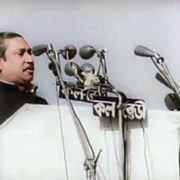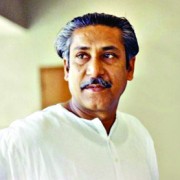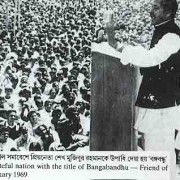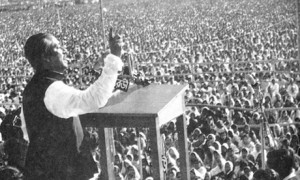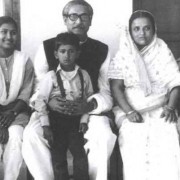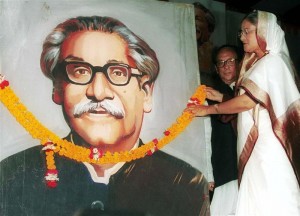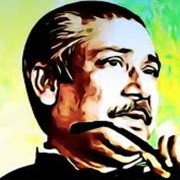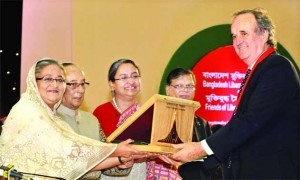The 7th March speech of Bangabandhu was the definitive commencement of Liberation war.

“Ebarer sangram amader shadhinoter sangram”—–The historic address at the Race Course ground, March 7, 1971.
The independence of Bangladesh was declared by Sheikh Mujibur Rahman through a message on 26 March 1971 just before he was arrested at about 1:30 a.m. This declaration of independence marks the beginning of the Liberation War.
“This may be my last message, from today Bangladesh is independent. I call upon the people of Bangladesh wherever you might be and with whatever you have, to resist the army of occupation to the last. Your fight must go on until the last soldier of the Pakistan occupation army is expelled from the soil of Bangladesh and final victory is achieved.”
Bangabandhu spread the declaration and was reached to many. The wife of M.R. Siddiqi was given an urgent message over telephone from Bangabandhu received through the wireless operators of Chittagong. [ Sheikh Mujib: Triumph and Tragedy by S. A. Karim]
DECLARATION OF INDEPENDENCE FROM KALURGHAT (March 26, 1971):
Soon after the Pakistani army crackdown on the night of March 25, 1971,the first declaration of independence was made over the radio by M. A. Hannan. According to the English language newspapers from around the flashed around the world on news wires on the evening of March 26, 1971 and the world came to know about the independence of Bangladesh from Sheikh Mujibur Rahman’s original message received in Calcutta on the morning of March 26 and from broadcasts from Swadhin Bangla Betar Kendro on the evening of March 26.
The following world press also reported on 26th March:
The Statesman and The Times of India from India; Buenos Aires Herald from Argentina; The Age, The Sydney Morning Herald from Australia; The Guardian from Burma; The Globe and Mail from Canada; Hong Kong Standard from Hong Kong; The Jakarta Times from Indonesia; Asahi Evening News from Japan; The Rising Nepal from Nepal; The Manila Times from the Philippines; The Straits Times from Singapore; The Pretoria News from South Africa; The Bangkok Post from Thailand; The Daily Telegraph, The Guardian, The Times of London from the United Kingdom; and, Baltimore Sun, The Boston Globe, Chicago Tribune, Christian Science Monitor, Los Angeles Times, The New York Times, The Philadelphia Inquirer, San Francisco Chronicle and The Washington Post from the United States.
Bangabandhu dictated the declaration through telegram, A telegram containing the text of Sheikh Mujibur Rahman’s declaration reached some students in Chittagong. The message was translated to Bangla by Dr. Manjula Anwar. The students failed to secure permission from higher authorities to broadcast the message from the nearby Agrabad Station of Radio Pakistan.
The Kalurghat Radio Station’s transmission capability was limited, but the message was picked up by a Japanese ship in Bay of Bengal. It was then re-transmitted by Radio Australia and later by the British Broadcasting Corporation.
Announcement of the declaration of independence:
Awami League leader M.A. Hannan aired the declared the independence on behalf of Bangabandhu : (Signed by Bangabandhu):
Abul Kashem Sandeep translated the message to broadcast.
“Today Bangladesh is a sovereign and independent country. On Thursday night West Pakistani armed forces suddenly attacked the police barracks at Razarbagh and the EPR headquarters at Pilkhana in Dhaka. Many innocent and unarmed have been killed in Dhaka city and other places of Bangladesh. Violent clashes between EPR and Police on the one hand and the armed forces of Pindi on the other, are going on. The Bengalis are fighting the enemy with great courage for an independent Bangladesh. May God aid us in our fight for freedom. Joy Bangla.”
Pakistani sources:
Siddiq Salik had written that he heard about Mujibor Rahman’s message on the radio while Operation Searchlight was going on. [ “Witness to Surrender” ]
The Statesman published from New Delhi on March 27, 1971 and explained the two messages received on March 26:
Sheikh Mujibur Rahman made two broadcasts on Friday following the Pakistani troops move to crush his movement, says UNI.
Announcement of the declaration of independence by Major Zia on behalf of Bangabandhu
There are Major Zia declared the independence on behalf of Sheikh Mujibur Rahman.
# Maj. Gen. Hakeem A. Qureshi in his book The 1971 Indo-Pak War: A Soldier’s Narrative, gives the date of Zia’s speech as 27 March 1971.
# MASSACRE by Robert Payne, Publisher : The McMillan Company New York.
# J. S. Gupta The History of the Liberation Movement in Bangladesh
# India, Pakistan, and the United States: Breaking with the Past By Shirin R. Tahir-Kheli ISBN 0-87609-199-0, 1997, Council on Foreign Relations. pp 37
Major Zia’s declaration of independence on behalf of Bangabandhu was made controversial over an Very few people heard this declaration and Major Zia’s famous “Ami Major Zia Bolchhi”.
“Our struggle is for our freedom. Our struggle is for our independence.” The speech is regarded as the de facto declaration of independence although a formal declaration came on March 26, 1971
Our history has undergone huge twist at the hands of vested quarters. Some people claim that Zia declared himself as provisional commander in chief. In fact Zia made two speeches. When this unauthorized speech created confusion among the people, the Awami League leaders asked Zia to read out a text prepared by A. K. Khan.
Zia followed the suggestion, and made a second speech, where he mentioned that he was speaking on behalf of our great national leader Bangabandhu Sheikh Mujibur Rahman.
Announcement
The government of theSoverignStateon behalf of our great national leader, the supreme commander ofBangladeshSheikh Mujibur Rahman, do hereby proclaim the independence ofBangladesh. And that the government headed by Sheikh Mujibur Rahman has already been formed. It is further proclaimed that Sheikh Mujibur Rahman is the sole leader of the elected representatives of seventy five million people ofBangladesh, and the government headed by him is the only legitimate government of the people of the independent soverign state ofBangladesh….
It was impractical to think of the declaration of independence without mentioning name of Bangabandhu. His name carries more value than any political party. The sky is the limit to measure the popularity of Sheikh Mujib and the landslide victory of 70’s election was its reflection only.
Zia read out the declaration on behalf of Bangbanandhu. Formation of Mujib Nagar Government carries the historic significance.
Bangabandhu’s Declaration of Independence.
(Reserved in Liberation War Museum, Segun Bagicha, Dhaka)
Telex Copy of Bangabandhu’s Declaration of Independence

